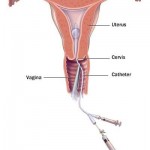How long should women try to get pregnant before calling their doctors?
Most experts suggest at least one year. Women aged 35 years or older should see their doctors after six months of trying. A woman’s chances of having a baby decrease rapidly every year after the age of 30.
 Some health problems also increase the risk of infertility. So, women should talk to their doctors if they have—
Some health problems also increase the risk of infertility. So, women should talk to their doctors if they have—
- Irregular periods or no menstrual periods
- Very painful periods
- Endometriosis
- Pelvic inflammatory disease
- More than one miscarriage
It is a good idea for any woman to talk to a doctor before trying to get pregnant. Doctors can help you get your body ready for a healthy baby. They can also answer questions on fertility and give tips on conceiving.
How will doctors find out if a woman and her partner have fertility problems?
Doctors will do an infertility checkup. This involves a physical exam. The doctor will also ask for both partners’ health and sexual histories. Sometimes this can find the problem. However, most of the time, the doctor will need to do more tests.
In men, doctors usually begin by testing the semen. They look at the number, shape, and movement of the sperm. Sometimes doctors also suggest testing the level of a man’s hormones.
In women, the first step is to find out if she is ovulating each month. There are a few ways to do this. A woman can track her ovulation at home by—
- Writing down changes in her morning body temperature for several months
- Writing down how her cervical mucus looks for several months
- Using a home ovulation test kit (available at drug or grocery stores)
Doctors can also check ovulation with blood tests. Or they can do an ultrasound of the ovaries. If ovulation is normal, there are other fertility tests available.
Some common tests of fertility in women include—
- Hysterosalpingography (HIS-tur-oh-sal-ping-GOGH-ru-fee): This is an X-ray of the uterus and fallopian tubes. Doctors inject a special dye into the uterus through the vagina. This dye shows up in the X-ray. Doctors can then watch to see if the dye moves freely through the uterus and fallopian tubes. This can help them find physical blocks that may be causing infertility. Blocks in the system can keep the egg from moving from the fallopian tube to the uterus. A block could also keep the sperm from reaching the egg.
- Laparoscopy (lap-uh-ROS-kuh-pee): A minor surgery to see inside the abdomen. The doctor does this with a small tool with a light called a laparoscope (LAP-uh-roh-skohp). She or he makes a small cut in the lower abdomen and inserts the laparoscope. With the laparoscope, the doctor can check the ovaries, fallopian tubes, and uterus for disease and physical problems. Doctors can usually find scarring and endometriosis by laparoscopy.
Finding the cause of infertility can be a long and emotional process. It may take time to complete all the needed tests. So don’t worry if the problem is not found right away.
How do doctors treat infertility?
Infertility can be treated with medicine, surgery, artificial insemination, or assisted reproductive technology. Many times these treatments are combined. In most cases infertility is treated with drugs or surgery.
Doctors recommend specific treatments for infertility based on—
- Test results
- How long the couple has been trying to get pregnant
- The age of both the man and woman
- The overall health of the partners
- Preference of the partners
Doctors often treat infertility in men in the following ways—
- Sexual problems: Doctors can help men deal with impotence or premature ejaculation. Behavioral therapy and/or medicines can be used in these cases.
- Too few sperm: Sometimes surgery can correct the cause of the problem. In other cases, doctors surgically remove sperm directly from the male reproductive tract. Antibiotics can also be used to clear up infections affecting sperm count.
- Sperm movement: Sometimes semen has no sperm because of a block in the man’s system. In some cases, surgery can correct the problem.
In women, some physical problems can also be corrected with surgery.
A number of fertility medicines are used to treat women with ovulation problems. It is important to talk with your doctor about the pros and cons of these medicines. You should understand the possible dangers, benefits, and side effects.
What medicines are used to treat infertility in women?
 Some common medicines used to treat infertility in women include—
Some common medicines used to treat infertility in women include—
- Clomiphene citrate (Clomid®): This medicine causes ovulation by acting on the pituitary gland. It is often used in women who have polycystic ovarian syndrome (PCOS) or other problems with ovulation. This medicine is taken by mouth.
- Human menopausal gonadotropin or hMG (Repronex®, Pergonal®): This medicine is often used for women who don’t ovulate due to problems with their pituitary gland—hMG acts directly on the ovaries to stimulate ovulation. It is an injected medicine.
- Follicle-stimulating hormone or FSH (Gonal-F®, Follistim®): FSH works much like hMG. It causes the ovaries to begin the process of ovulation. These medicines are usually injected.
- Gonadotropin-releasing hormone (Gn-RH) analog: These medicines are often used for women who don’t ovulate regularly each month. Women who ovulate before the egg is ready can also use these medicines. Gn-RH analogs act on the pituitary gland to change when the body ovulates. These medicines are usually injected or given with a nasal spray.
- Metformin (Glucophage®): Doctors use this medicine for women who have insulin resistance and/or PCOS. This drug helps lower the high levels of male hormones in women with these conditions. This helps the body to ovulate. Sometimes clomiphene citrate or FSH is combined with metformin. This medicine is usually taken by mouth.
- Bromocriptine (Parlodel®): This medicine is used for women with ovulation problems due to high levels of prolactin. Prolactin is a hormone that causes milk production.
Many fertility drugs increase a woman’s chance of having twins, triplets, or other multiples. Women who are pregnant with multiple fetuses have more problems during pregnancy. Multiple fetuses have a high risk of being born too early (prematurely). Premature babies are at a higher risk of health and developmental problems.

